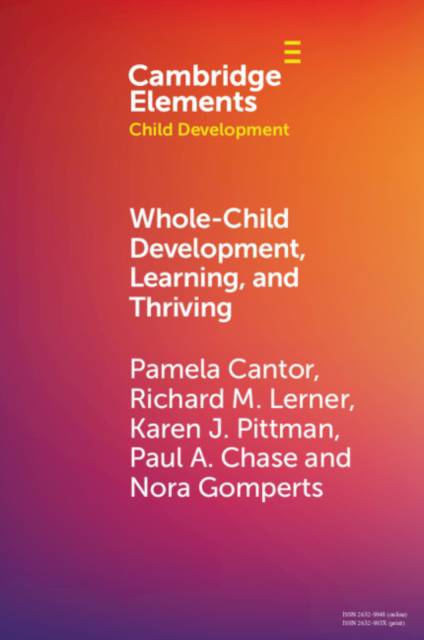
- Afhalen na 1 uur in een winkel met voorraad
- Gratis thuislevering in België vanaf € 30
- Ruim aanbod met 7 miljoen producten
- Afhalen na 1 uur in een winkel met voorraad
- Gratis thuislevering in België vanaf € 30
- Ruim aanbod met 7 miljoen producten
Zoeken
Whole-Child Development, Learning, and Thriving
A Dynamic Systems Approach
Pamela Cantor, Richard M Lerner, Karen J Pittman
€ 31,95
+ 63 punten
Omschrijving
We discuss whole-child development, learning, and thriving through a dynamic systems theory lens that focuses on the United States and includes an analysis of historical challenges in the American public education system, including inequitable resources, opportunities, and outcomes. To transform US education systems, developmental and learning scientists, educators, policymakers, parents, and communities must apply the knowledge they have today to 1. challenge the assumptions and goals that drove the design of the current US education system, 2. articulate a revised, comprehensive definition of whole-child development, learning, and thriving that accepts rather than simplifies how human beings develop, 3. create a profound paradigm shift in how the purpose of education is described in the context of social, cultural, and political forces, including the impacts of race, privilege, and bias and 4. describe a new dynamic 'language' for measurement of both the academic competencies and the full set of 21st century skills.
Specificaties
Betrokkenen
- Auteur(s):
- Uitgeverij:
Inhoud
- Aantal bladzijden:
- 75
- Taal:
- Engels
- Reeks:
Eigenschappen
- Productcode (EAN):
- 9781108949569
- Verschijningsdatum:
- 20/05/2021
- Uitvoering:
- Paperback
- Formaat:
- Trade paperback (VS)
- Afmetingen:
- 152 mm x 229 mm
- Gewicht:
- 140 g

Alleen bij Standaard Boekhandel
+ 63 punten op je klantenkaart van Standaard Boekhandel
Beoordelingen
We publiceren alleen reviews die voldoen aan de voorwaarden voor reviews. Bekijk onze voorwaarden voor reviews.











